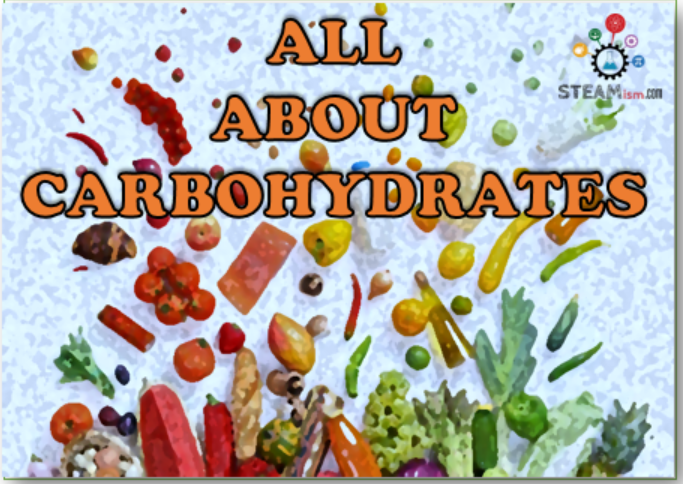What are carbohydrates?
- Carbohydrates are compounds found in living things.
- Their molecules are made up of carbon (C), hydrogen (H) and oxygen (O) atoms
- The ratio is 2 hydrogen atoms to every 1 oxygen atom
- Carbohydrates are a very important source of energy in a healthy diet.
- Starchy and sugary foods are high in carbohydrates.
What are the types of carbohydrates?
The main types of carbohydrates are:
- Simple carbohydrates (also known as simple sugars)
The basic units of carbohydrates are simple sugar molecules like glucose, fructose and sucrose. Lollipops and sugar are good examples of simple carbohydrates. So are milk and apples. Then why are milk and fruit better for you than lollipops and sugar? Because these don’t contain added sugar (they contain natural sugars) and they also contain additional vitamins, fiber, and important nutrients like calcium.
- Complex carbohydrates (also known as starches)
These are formed of long chains of sugars joined together. Grain products like bread, crackers, rice, pasta and potatoes contain complex carbohydrates. Just like simple carbs, some complex carbohydrates are better than others. Whole grains like brown rice and oatmeal are healthier complex carbohydrates than processed or refined grains like white flour and white rice (nutrients and fiber are removed from these in processing). Whole grains contain nutrients like vitamins and minerals and are rich in fiber, which helps you feel full.
How are carbohydrates used by our body?
As we said earlier, carbohydrates are an important source of energy that give our body the energy it needs.
Carbohydrates are broken down by the body into glucose, which can be absorbed into the bloodstream. As the sugar level rises in your body, the pancreas releases a hormone called insulin. Insulin is needed to move sugar from the blood into the cells, where the sugar can be used as an energy source for respiration and other processes. The glucose reacts with oxygen, releasing energy.
When this process goes fast — as with simple sugars — these are quickly absorbed into the blood stream, your body gets a quick but short-lasting energy boost but you’re also more likely to feel hungry again soon.
When it goes more slowly, as with a whole-grain food or starch, this long and complex molecule is harder to break down into glucose and so the process takes longer. Energy is released slowly and so you’ll be satisfied longer. These types of complex carbs give you energy over a longer period of time.
- An Interview with the Co-Founders of Dermanostix - August 14, 2020
- NASA & SpaceX’s Successful Space Launch - June 12, 2020
- Types of Engineering - June 10, 2020
